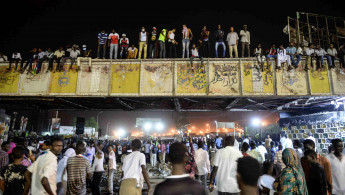40 Sudan Eid massacre corpses 'pulled from River Nile'
Forty dead bodies were pulled from the River Nile that runs through the Sudanese capital Khartoum, reports said on Wednesday, as the death toll from the Eid massacre continues to rise.
The Central Committee of Sudanese Doctors announced on Wednesday that 40 dead bodies were pulled from the River Nile, along with the estimated 60 already killed during the vicious attack on peaceful Sudanese protesters carried out by the Saudi-backed army earlier on Monday.
“40 bodies of our martyrs were recovered from the River Nile yesterday”, the union announced on its Facebook.
“The peaceful revolution will reach victory and the military council will fail”, they added.
The discovery has increased the death toll to 100, but activists on the ground fear the death toll to be far higher than the current figures.
A day after the massacre began, the Sudan's military ruler on Tuesday cancelled negotiations over a transition period to ultimately lead the country to civilian rule and declared snap elections – a move objected by the Sudanese opposition.
"We refuse the call for an early election and we consider the statement of the military council conforms with the counter-revolution and is linked to the interests of the old regime," Omar al-Dukair, the Secretary General of the Sudanese Congress party, told reporters in Khartoum.
Rights watchdog Amnesty International deplored the army's violence which "destroyed the trust of the Sudanese people".
"Many of those attacked this morning were sleeping when the Rapid Support Forces and other Sudanese security agencies began unleashing deadly violence," Sarah Jackson, Amnesty International's Deputy Regional Director for East Africa, the Horn and the Great Lakes, said.
"With this senseless slaughter the [transitional military council] has completely destroyed the trust of the Sudanese people and crushed the people's hope for a new era of respect for human rights and respect for the right to protest without fear," Jackson added.
"The Sudanese people suffered for decades under the repressive rule of Omar al-Bashir, and his ousting should have represented a new chapter of respect for human rights," Jackson said.
Follow us on Twitter: @The_NewArab





 Follow the Middle East's top stories in English at The New Arab on Google News
Follow the Middle East's top stories in English at The New Arab on Google News

![22 Arab countries at COP29 have rejected the targeting of fossil fuels [Getty]](/sites/default/files/styles/image_330x185/public/2024-11/GettyImages-2184289638.jpg?h=199d8c1f&itok=ptHl5bec)
![Dozens of people turned out for the funerals [Getty]](/sites/default/files/styles/image_330x185/public/2024-11/GettyImages-2185229760.jpg?h=e7c891e8&itok=1bctDcE6)